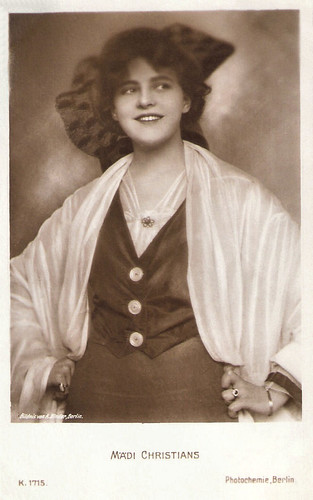
German postcard by Photochemie, Berlin, no. K. 1715. Photo: Alex Binder, Berlin.
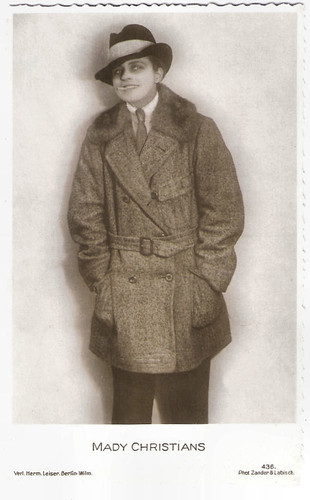
German postcard by Verlag Hermann Leiser. Berlin-Wilm., no. 436. Photo: Zander & Labisch.

German postcard by Ross Verlag, no. 460/1, 1919-1924. Photo: Rembrandt.
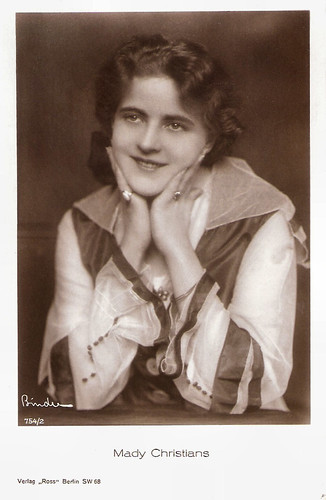
German postcard by Ross Verlag, Berlin, no. 754/2, 1925-1926. Photo: Alex Binder, Berlin.
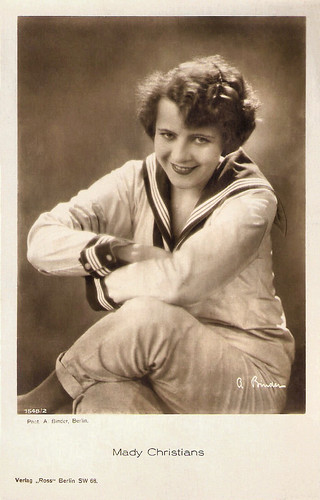
German postcard by Ross Verlag, no. 1548/2, 1927-1928. Photo: Alex Binder, Berlin.
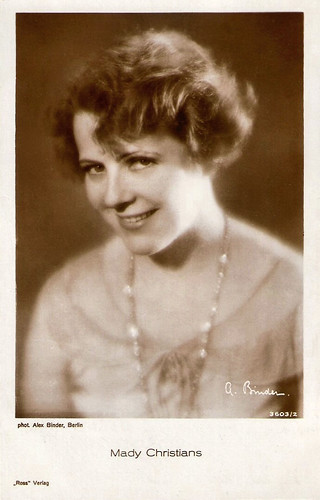
German postcard by Ross Verlag, no. 3603/2, 1928-1929. Photo: Alex Binder, Berlin.
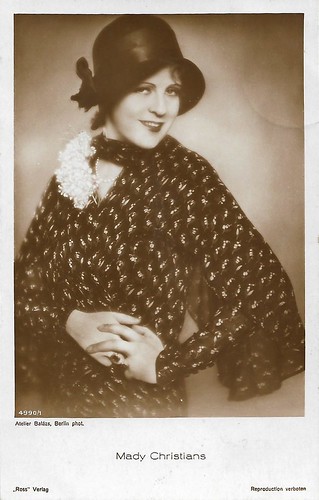
German postcard by Ross Verlag, no. 4990/1, 1929-1930. Photo: Atelier Balazs, Berlin.

German postcard by Ross Verlag, no. 5216/2, 1930-1931. Photo: Atelier Manassé, Wien.
The Man Without a Name
Mady Christians was born as Marguerita Maria Christians in Vienna, Austria-Hungary (now Austria) in 1892. She was the daughter of opera singer Bertha Klein and actor Rudolph Christians. When her father took over a German-speaking theater in New York in 1912, the whole family went to the USA, where Mady made her film debut in Audrey (Robert G. Vignola, 1916) as Margarete Christians.
Because of World War I, Mady and her mother returned mother to Europe and she studied in Berlin with Max Reinhardt. She worked as a stage actress, but soon she was monopolised by the new cinema world.
She played leads in silent films like Die fremde Frau/The Strange Woman (Hubert Moest, 1917) with Hedda Vernon, Nachtschatten/Night Shadows (Friedrich Zelnik aka Frederic Zelnik, 1918), and Die Gesunkenen/The Down-and-outs (Fred Sauer, 1919). Her breakthrough was her part in the serial Der Mann ohne Namen/The Man Without A Name (Georg Jacoby, 1921) with Harry Liedtke as the thief Peter Voss.
In the following years, she appeared in several classics of the Weimar cinema such as Das Weib des Pharao/Pharoah's Wife (Ernst Lubitsch, 1922), Ein Glas Wasser/One Glass of Water (Ludwig Berger, 1923), Die Finanzen des Großherzogs/Finances of the Grand Duke (F.W. Murnau, 1924), Michael (Carl Theodor Dreyer, 1924), Ein Walzertraum/The Waltz Dream (Ludwig Berger, 1925) and in the two-part costume drama Königin Luise/Queen Louise (Karl Grune, 1927-1928).
In 1928 she founded with director Ludwig Berger the Länder-Film Company in Berlin, but the company was already finished by 1931. She acted in the British production The Runaway Princess (Anthony Asquith, Fritz Wendhausen, 1929) and in the French Mon coeur incognito/My Heart is Incognito (André-Paul Antoine, Manfred Noa, 1930) opposite Jean Angelo, an alternative language version of Leutnant warst Du einst bei deinen Husaren (Manfred Noa, 1930) with Gustav Diessl. The German sound film offered her only little work, but she did appear in Das Schicksal der Renate Langen/The Fate of Renate Langen (Rudolf Walther-Fein, 1931) and Friederike/Frederica (Fritz Friedmann-Frederich, 1932).
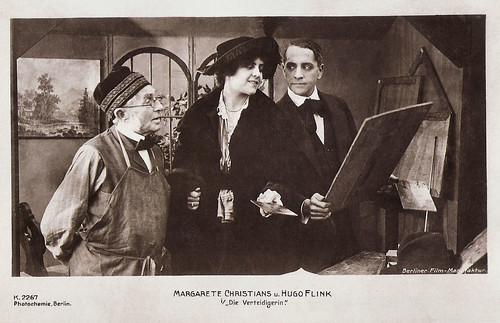
German postcard by Photochemie, no. K. 2267. Photo: Berliner Film-Manufaktur. Mady Christians (here: Margarethe Christians) and Hugo Flink in Die Verteidigerin/The Defender (Friedrich Zelnik, 1918).

German postcard by Photochemie, no. K. 2285. Photo: Berliner Film-Manufaktur. Mady Christians (here: Margarethe Christians) in Die Dreizehn/The Thirteen (Alfred Halm, 1918).
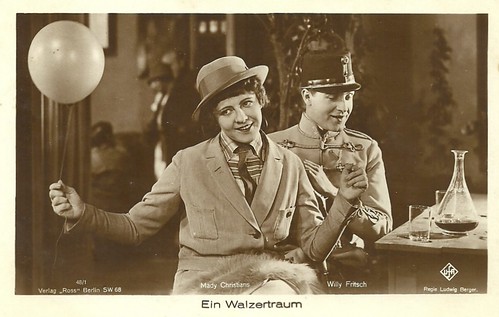
German postcard by Ross Verlag, no. 48/1. Mady Christians and Willy Fritsch in the Ufa-film Ein Walzertraum (Ludwig Berger, 1925).

German postcard by Ross Verlag, no. 65/1. Photo: Aafa-Film. Mady Christians and Bruno Kastner in Die geschiedene Frau/The Divorcée (Victor Janson, 1926).

German postcard by Ross Verlag, no. 65/3. Photo: Aafa-Film. Mady Christians and Viktor Janson in Die geschiedene Frau/The Divorcée (Victor Janson, 1926).
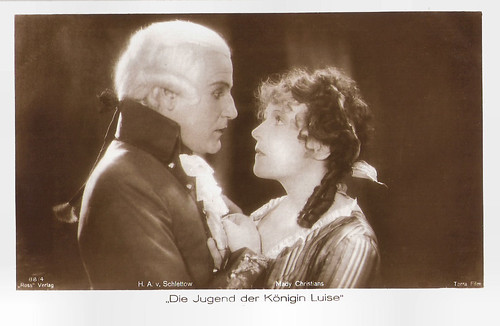
German postcard by Ross Verlag, no. 88/4. Photo: Terra Film. Publicity still for Königin Luise, 1. Teil - Die Jugend der Königin Luise/Queen Louise (Karl Grune, 1927) with Hans Adalbert Schlettow.
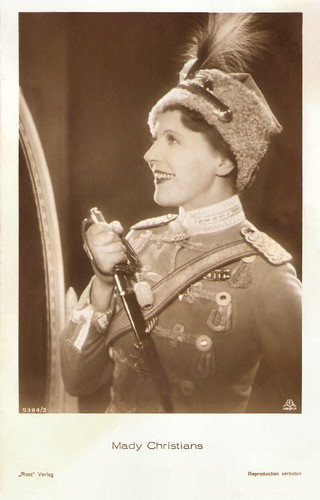
German postcard by Ross Verlag, no. 5384/2, 1930-1931. Photo: AAFA Film. Publicity still for Leutnant warst Du einst bei deinen Husaren/Lieutenant were you once with your Hussar (Manfred Noa, 1930).
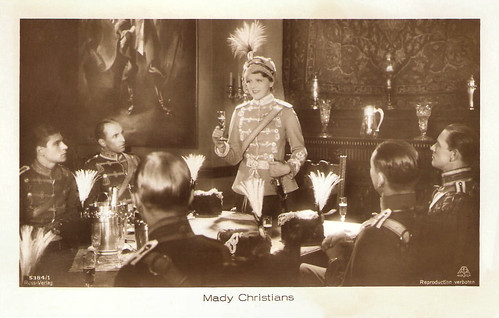
German postcard by Ross Verlag, no. 5384/1, 1930-1931. Photo: AAFA Film. Publicity still for Leutnant warst Du einst bei deinen Husaren/Lieutenant were you once with your Hussar (Manfred Noa, 1930).
I Remember Mama
After the assumption of power by the Nazis in 1933, Mady Christians emigrated to the United States. In the following decades, she shuttled between Hollywood and Broadway.
In Hollywood, she starred in The Only Girl (Frederick Hollander/Friedrich Holländer, 1934) with Charles Boyer. She appeared in several popular pictures like A Wicked Woman (Charles Brabin, 1934), Escapade (Robert Z. Leonard, 1935) with William Powell, Come and Get It (Howard Hawks a.o., 1936), Seventh Heaven (Henry King, 1937) with James Stewart, and Tender Comrade (Edward Dmytryk, 1943) with Ginger Rogers.
In films, she tended to play supporting character parts, while on stage she continued to find leading roles. On Broadway, she originated the title role in the play I Remember Mama (1944). In 1945 she became a drama teacher at Columbia University.
Her last movie roles were in Letter from an Unknown Woman (Max Ophüls, 1948) and All My Sons (Irving Reis, 1948) based on the play by Arthur Miller, in which she co-starred with Burt Lancaster and Edward G. Robinson.
In 1950 she was blacklisted after being labelled a communist sympathizer during the McCarthy-era ‘witch trials’. Mady Christians died in 1951 in Norwalk, Connecticut, from a cerebral haemorrhage.
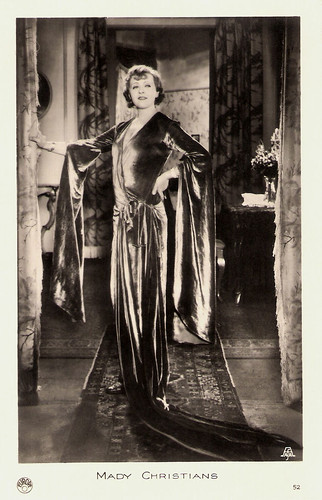
French postcard by Europe, no. 52. Photo: Aafa.

German postcard by Ross Verlag, no. 5385/1, 1930-1931. Photo: Aafa-Film. Gustav Diessl and Mady Christians in Leutnant warst Du einst bei deinen Husaren/Lieutenant were you once with your Hussar (Manfred Noa, 1930).
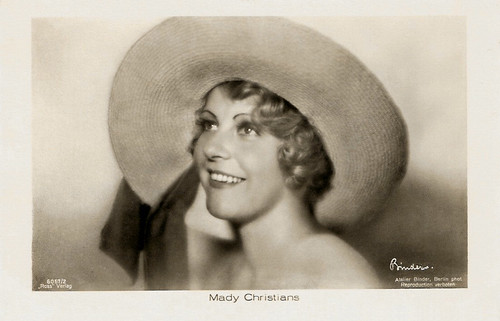
German postcard by Ross Verlag, no. 6067/2, 1931-1932. Photo: Alex Binder, Berlin.
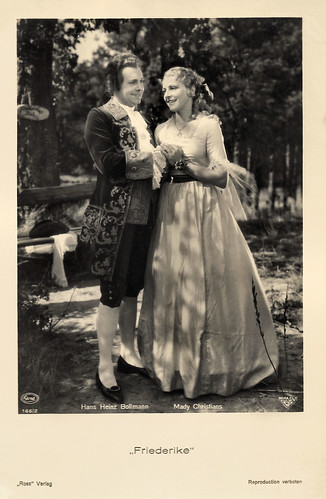
German postcard by Ross Verlag, no. 166/2. Photo: Indra-Film. Mady Christians and Hans Heinz Bollmann in Friederike/Frederica (Fritz Friedmann-Frederich, 1932).

German postcard by Ross Verlag, no. 181/2. Photo: Ufa. Lilian Harvey and Mady Christians in Ich und die Kaiserin (1933).
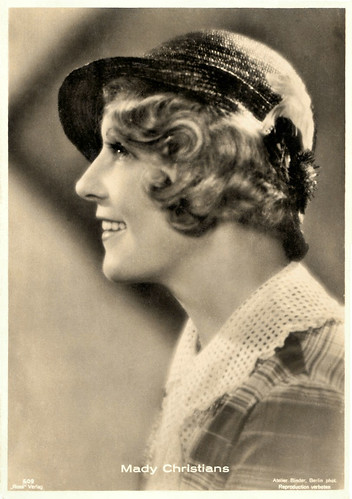
German postcard by Ross Verlag, no. 609 (Ross Luxus Series). Photo: Atelier Binder, Berlin.
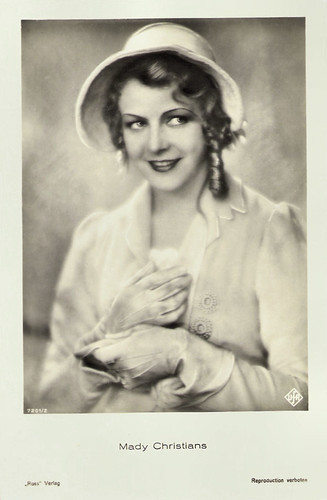
German postcard by Ross Verlag, Berlin, no. 7201/2, 1932-1933. Photo: Ufa.
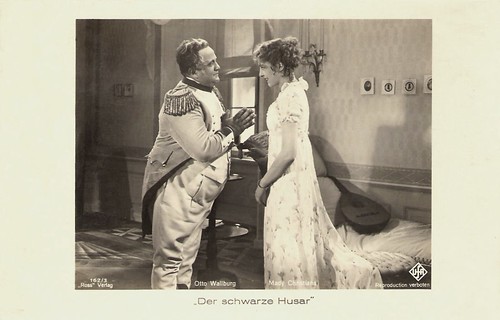
German postcard by Ross Verlag, no. 152/3 Photo: Ufa. Publicity still for Der Schwarze Husar/The Black Hussar (Gerhard Lamprecht, 1932) with Otto Wallburg.

German postcard by Ross Verlag, Berlin, no. 7205/1. Photo: Ufa. Conrad Veidt and Mady Christians in Der schwarze Husar/The Black Hussar (Gerhard Lamprecht, 1932).
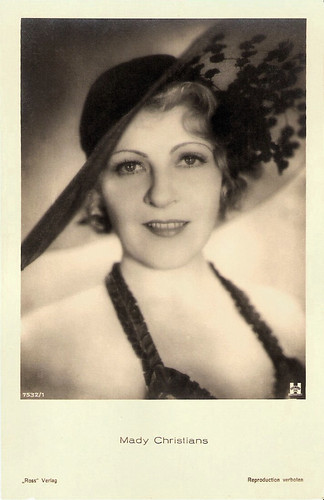
German postcard by Ross Verlag, no. 7532/1, 1932-1933. Photo: Hisa-Film. Publicity still for Manolescu, der Fürst der Diebe/Manolescu, the King of Thieves (Georg C. Klaren, Willi Wolff, 1933).
Source: Thomas Staedeli (Cyranos), Denny Jackson (IMDb), AllMovie, Wikipedia, and IMDb.
No comments:
Post a Comment